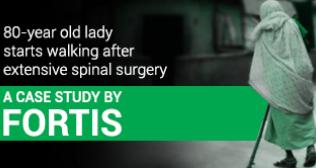
Myths Related to Spine Surgery
Erect posture and flexibility of our spine are maintained by synchrony among bony vertebra, muscles, intervertebral discs, ligaments and joints. Any disease related to these may lead to pain, deformity and disability. Spine surgery is needed in selected cases to cure such patients. Some myths attributed to spine surgery prevent patients from consulting a spine specialist and the ailment progresses to a stage where the pathology becomes irreversible. Some of these myths are,
1. Myth: Spine surgeon always advises surgery
Fact: Less than 1% of people suffering from backache require surgery. Most patients are prescribed medicines, precautions and physiotherapy. Surgery is mandatory if there is a weakness due to nerve / spinal cord compression.
2. Myth: Spine surgery always leads to paraplegia
Fact: Decompression of nerves and spinal cord treats limb weakness. Incidence of new deficits after surgery is rare at a well-equipped Neuro-spine centre. However, pre-surgery deficits may take a few months to recover.
3. Myth: Prolong bed rest is needed after spine surgery
Fact: Early mobilization is the goal of minimally invasive surgery. The patient can use the washroom, walk inside the room/home or climb stairs within 3 days of elective spine surgery.
4. Myth: Spine surgery can be done at any hospital
Fact: A lot of new, expensive and modern gadgets like operating microscopes, high-speed drills, neuro-navigation, minimally invasive techniques and neuro-monitoring have revolutionised the results of spine surgery. These are available, only at a dedicated Neuro-spine centre.
5. Myth: Pain persists after spine surgery
Fact: Surgery relieves pain in more the 95% of cases. Cervical spine surgery is very rewarding in terms of pain relief. On the contrary, since the low back is a weight-bearing region, pain may persist for some weeks. Physiotherapy and precautions are required even after surgery in such cases.
6. Myth: ‘Wait and watch’ is better than surgery
Fact: There are certain ailments where immediate surgery can reverse symptoms, rapidly. Recent neurological deficits, neural compression due to trauma or infection, bony instability or spine tumour are indications for urgent surgery.
7. Myth: Implants should not be used in spine surgery
Fact: Spinal implants help to achieve desired alignment and stability of the spine. Some doctors do not recommend spine surgery – doctors have different opinions based on their experience and academic knowledge. Spine surgery is an evolving branch and new techniques are introduced every other day. Most doctors, who speak against surgery, are either not updated or are influenced by their ancient knowledge / bad experiences.
Modern gadgets like operating microscopes and high-speed drills, and minimally invasive techniques help in safe but aggressive spine surgery. It is important to consult a Neurosurgeon at a well-equipped hospital. A second or third opinion can also be taken to gain confidence about the proposed surgical procedure. In the present era, at a good Neuro-spine centre, 95% of patients improve by more than 95% after spine surgery.
Categories
Clear allMeet the doctor

- Neurosurgery | Neurosurgery | Neuro and Spine Surgery
-
20 Years
-
1500
 Available at 1 different locations
Available at 1 different locations




















